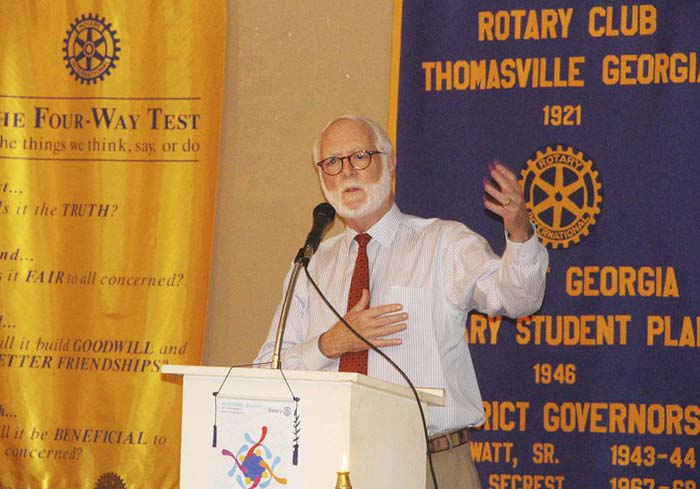Clough’s journeys through the Smithsonian take him back to Georgia roots
Published 2:39 pm Friday, January 17, 2020

- Pat Donahue/Times-EnterpriseFormer Georgia Tech president and Smithsonian Institution secretary emeritus Dr. Wayne Clough describes what he found in the Smithsonian’s collections that came from south Georgia.
THOMASVILLE — Wayne Clough grew up in the small south Georgia town of Douglas — but along the way his stops included being the president of Georgia Tech and the secretary of the Smithsonian Institution.
Clough, the first Georgia Tech alumnus to lead the school, spoke to the Thomasville Rotary Club and the Thomasville History Center about his recent book, “Things New & Strange: A Southerner’s Journey through the Smithsonian Collections.”
The Smithsonian is home to 155 million objects. Clough, though, said he needed to see where some of those items originated. He was astounded to find how many of them came from south Georgia. That took him back to his roots.
“I had to see the places where those things were collected,” he said.
That included visiting Enigma, famed in the Smithsonian because a meteorite landed there.
“How it got its name is the guy said I’ve tried out a bunch of different names and all of them are taken. It’s an enigma,” Clough said. “So I’ve been to a lot of unusual places.”
His book’s title is taken from a letter written by an early English naturalist to his sponsor, the Princess of Wales, that said, “Dear Madam, I have seen things new and strange you will never see in your life.” Proceeds from the sale of this book will benefit the Smithsonian Institution.
During his formative years in south Georgia, paved roads were few and far between. Many of his classmates had to get rid of hookworms before they could go to school.
“That’s what it was like,” he said. “We didn’t have electricity on the farm. That’s what it was like when I was growing up.
“Now, the schools have integrated. You have four lane roads with cars whizzing by. A lot of good things happened to Georgia. We were way behind. Everything is better off. Those are all good things. The question is, is that working for everybody.”
The end of school segregation lifted many communities but that effect has stalemated, Clough said.
“Some people got left behind,” he said. “Some small towns are going out of business. You can see it when you drive through them. Some towns are doing pretty well. It’s not easy, because you’re competing against a global economy.”
The key to lift south Georgia is education, Clough pointed out.
While growing up in Coffee County, Clough admitted to being in the woods all the time and “doing everything I could to stay out of school.”
When Clough returned to Tech as president, some of his old professors and instructors were still on the faculty.
“And they wondered why I was there,” he joked.
But his parents, who struggled through the Great Depression, vowed he and his siblings would go to college.
“My folks didn’t have any money,” he said. “They didn’t go to college. They got crushed by the Depression. but they wanted their three kids to go to college.”
His alma mater now has the G. Wayne Clough Georgia Tech Promise Scholarship, designed for students whose household income does not exceed $33,000. Under the program, students graduate debt-free.
The first student to go through was Duane Carver from Brunswick. He was an honors student but his family was living in his mother’s car. Through the Promise Scholarship, he graduated from Tech in three years with a degree in computer science.
He went to work for IBM and eventually earned a law degree from Cal-Berkeley. He now practices intellectual property law in Atlanta.
Clough said Carver told him the rest of the story — he wanted to save enough money to send his sister to college. Once that happened, they paid for their mother to go to college.
And now their mother is a grade school teacher.
“What the scholarship did for me is it lifted my family out of poverty,” Clough recalled Carver telling him.
Georgia Tech grants 20,000 degrees a year in computer science, 15 percent of the total produced globally, Clough pointed out, but the bulk of those degrees are completed online.
Education and broadband services are key to stimulating south Georgia, according to Clough.
“That’s what’s going to be the key for the future,” he said.
Clough said he was always interested in science but also has been an avid reader and had a particular fondness for history. He said a community’s belief in its history and culture is crucial.
“And Thomasville has it,” he said. “You’ve really invested in it.”
Clough visited the Jack Hadley Black History Museum and was astounded. During his tenure atop the Smithsonian, the organization opened the National Museum of African American History and Culture, the newest of the Smithsonian Institution’s 19 museums.
“What an amazing thing that museum is,” Clough said of Hadley’s facility. “You are lucky to have that museum.”
Clough’s father had been instrumental in getting Douglas’ first hospital he built, and a community needs to be dedicated to having a good hospital, good schools and a good heritage, he said.
“Finally, learn to appreciate what you have in natural resources,” he said. “I’ve traveled all over the world. I’ve seen places no one else will ever go to. I reflected on how beautiful south Georgia is.
“There are certain things communities do to make themselves viable. So when people come in to do economic development, they know it. They can feel it. They can see it.”
Editor Pat Donahue can be reached at (229) 226-2400 ext. 1806.




